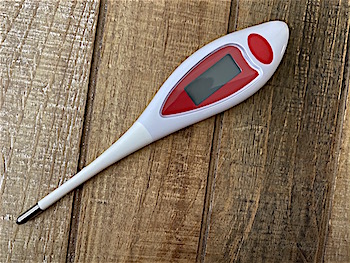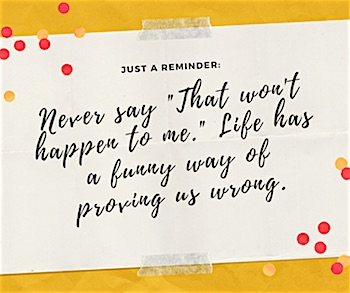Blog
The Wake Up Call That Changed Everything
Author: Kathleen Nelson-Simley
Posted: Wednesday - April 15, 2020
It was a phone call I wasn’t expecting. It was news I wasn’t prepared to hear.
“You have been exposed to the coronavirus in your home. You need to go into quarantine.”
Instantly, my life changed with this one phone call from the Nebraska Department of Health.
My mind was racing when I got off the phone:
-
Do I have the virus right now?
-
What do I need to do today in case I test positive for the virus tomorrow?
-
Do I have enough groceries and other supplies to survive during the quarantine?
-
Where might the virus be in my home? Where do I even begin to sanitize?
-
What have I already touched in my home that might have exposed me to the virus?
-
Who should I tell about my exposure?
-
How could this have happened to me?
Earlier in the day and before I received the phone call, I listened to the local news on television. I remembered hearing the report that day…14 confirmed community spread cases of COVID 19 in Lincoln and Lancaster County (total population of almost 314,000 people), with the county health department monitoring 110 known exposed individuals for symptoms.
When I heard the report I remembered thinking, “That’s still a pretty low number of cases.” Admittedly, I also thought, “The risk is still low.”
A few hours later is when I received the phone call. I was exposed by one of the 14 people and was one of the 110 people being monitored. Any thoughts of “it will never happen to me” or “I’m at low risk” were shattered and now unfounded.
In Nebraska, we currently don’t have a mandated “stay at home” order. So, having an imposed quarantine order placed on me to avoid risking the lives of others also imposed an emotional and mental burden with it. I immediately felt cut off from the rest of the world. Feelings of social responsibility, isolation, loneliness, sadness, fear, anxiety and stress ensued in the days to come.
Each day of living in quarantine is filled with uncertainty – uncertainty about if I was really infected, whether my body would be strong enough to fight the virus, financial loss if I was too sick to work or was hospitalized or how long the quarantine might last. Nothing in the future was “for sure” anymore.
Along with the uncertainty, comes fear – fear of the unknown. I never knew from one day to the next if I had the virus or not. Two times a day I reported my temperature to the county health department and answered questions about ten symptoms related to the virus. I remember the first day I had to say, “yes”, to two of the symptoms. I thought, “Does this mean I have the virus?” “How many symptoms do I have to report before they tell me to get tested?” I reported the same two symptoms multiple days in a row asking myself the same questions every day, but with no answers. The saying, “No answer is a good answer,” wasn’t always reassuring.
 The thermometer became my daily companion during my quarantine.
The thermometer became my daily companion during my quarantine.
I told my family and a handful of others about my exposure and quarantine. I feared the stigma that would be associated with my situation. I didn’t want to feel exiled, rejected or isolated any more than I already felt. I surrounded myself with a small support group of people who offered daily encouragement, positive energy, hope and prayer - exactly what I needed to get through some challenging days.
I was officially released from quarantine on Monday and cleared to go back to my normal routine and life. While I let out a big sigh of relief once I got the news, I also knew that my life will never be the same as it was before my exposure. It can’t be. My daily routine and habits were not what they needed to be to safeguard myself and others from the virus. Telling myself that “I’m at low risk” or “the odds of me getting the virus are minimal to nothing” can no longer be the story that runs through my head when listening to statistics on the local news. I was one of the statistics.
I am sharing my story with you for several reasons. First, re-evaluate your daily routine and habits to ensure you are doing everything you need to do to safeguard yourself from the virus. If there’s something you could be doing, but aren’t, or do more consistently, do it. Don’t short cut on any preventative measures you can take. The saying, “It’s better to be safe than sorry,” needs to be your personal mantra.
The second reason I am sharing my story with you is to make a confession. I was thinking a lot like a middle and high school student before being quarantined. Thinking I was invincible, nothing bad will happen to me and if it does, I’ll turn out ok”, compares to what many adolescents believe about themselves when it comes to engaging in risky behaviors. So, if you have placed yourself in some “low risk category” with the corona virus or convinced yourself, “It will never happen to me”, think again. I’m proof that thoughts like that are not true – just as untrue as they are with your middle and high school students. Everyone is at risk - at any time, any place and by anyone.

I am grateful to be on the other side of my quarantine period and to be healthy and safe at this time. A good number of you reached out to me last week when you didn’t receive my weekly blog in your Inbox. It’s the first week in almost a year that I didn’t write my blog. I just didn’t have the words to put on paper at that time. I appreciate receiving the inquiries of concern. Thank you.
Little did I know when I answered the phone that day it would be the wake up call I needed to change my behaviors and thinking and possibly save my life in the long term. I hope I never get a phone call like it again and I pray you don’t either.
So, stay safe, stay in and stay healthy.
Kathleen Nelson-Simley
Licensed All Stars Trainer


 The thermometer became my daily companion during my quarantine.
The thermometer became my daily companion during my quarantine.
